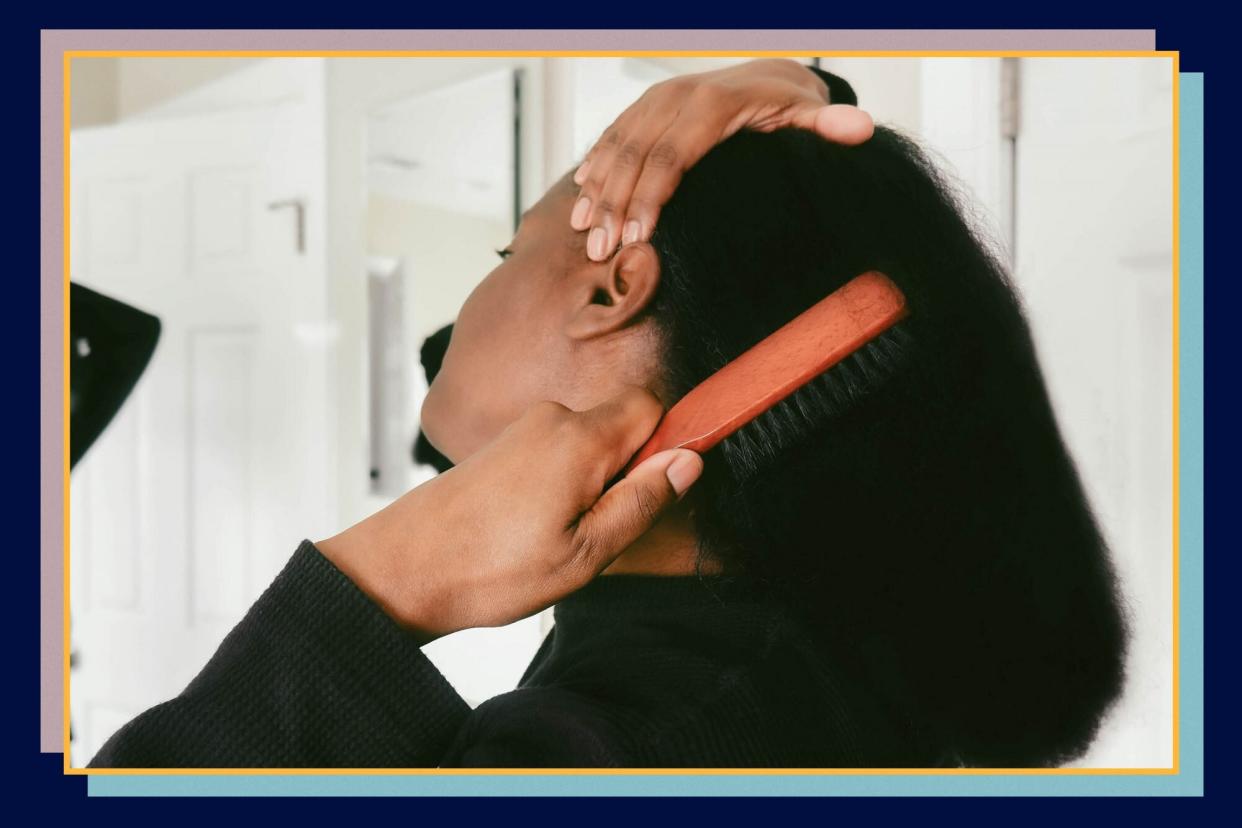5 Ways to Have Healthy Hair After Turning 40

Getty Images/InStyle
I've never had a thick, luscious head of hair. In fact, in second grade, one of my classmates remarked that my hair was "stringy" — rude, yes, but undeniably accurate.
Now, years later, my thirties and forties have been marked by a couple of periods of acute hair loss. The first was in my early thirties when I experienced telogen effluvium, a condition that causes excessive hair shedding due to stress or a traumatic event. (I had recently broken up with a long-term boyfriend, and I didn't have a full-time job since getting laid off a few months earlier.) The hair eventually grew back, but losing hair because of stress is, in and of itself, a stressful event — trust me.
The second time was when my son was around three months old and I was 42. Every time I washed my hair, clumps would fall out. This went on for more than a year. How was it possible that I was losing so much hair and somehow still had hair to lose? It's now slowly growing back, but in the meantime, I have some wisps around my hairline that are noticeably shorter than the rest of my hair.
Both of these incidents have made me wonder whether there are any steps I can take to try to ensure that the hair I do have stay as healthy as possible — and to prevent as much hair loss as I can. Here are five things every woman in her 40s should be doing to keep her hair healthy — and some advice on what to do if you've already started losing your hair.
RELATED: Extreme Hair Loss Is the Latest COVID Side-Effect You Need to Know About
1. Stay hydrated
We hear lots of advice about hydration when it comes to skin, but it's also extremely important for our hair health. "Drinking a lot of water helps with everything," says celebrity hair stylist, author, and educator Monae Everett. "Hair needs to be moisturized for hair growth and growth retention."
A good rule of thumb is for your daily water intake to be between half an ounce to an ounce for each pound you weigh (so someone weighing 140 pounds would drink between 70 and 140 ounces per day).
2. Avoid Over-Washing Your Hair
"Be sure not to over-wash your hair — that can really dry it out," says Ashley Streicher, hair stylist to Mandy Moore and Anne Hathaway and co-owner of the Beverly Hills beauty salon STRIIIKE. "It's definitely a thing that I see a lot."
But figuring out what constitutes over-washing for yourself might take a bit of trial and error, says hair restoration and facial plastic surgeon Dr. Gary Linkov. "You want to wash it enough that you get rid of the oily grime that blocks pores, so not showering for a week at a time is not ideal — but taking too frequent showers can dry out the hair, dry out the scalp and skin and can also be a problem." He suggests starting by washing hair every other day and seeing how your hair adapts.
For Black women, Everett suggests shampooing weekly, "even if you're wearing a protective style. You can shampoo braids, you can shampoo weaves — scalp health is crazy important."
VIDEO: InStyle On: Salon Naturals
3. Be Mindful of How You Style Your Hair
"Be gentle with your hair," says Everett. "All of these styles that are pulling and tugging on your hair — your hair is not as forgiving as it once was!"
Linkov also advises avoiding high-heat blow dryers and "harsh chemicals with different treatments for hair at the salon."
4. Consider a Hair Supplement
"As we age we stop producing as much oil and collagen, which not only affects our skin, but our hair," says Streicher. "I love a collagen supplement, or a hair and skin supplement."
Linkov recommends biotin-based supplements like Nutrafol and Viviscal, whose effectiveness have been shown through research and studies, but also points out that many foods are rich in biotin (aka Vitamin B7), including egg yolks, legumes, nuts and seeds, liver, sweet potatoes, bananas, and mushrooms.
5. If You notice Hair Loss, Consult a Doctor
Linkov says that for women, the causes of hair loss can be multifaceted and can include changing estrogen levels, low Vitamin D levels, thyroid conditions, and autoimmune conditions, as well as temporary conditions like telogen effluvium.
Treatments can include Minoxidil (aka Rogaine), Propecia (although not for women of childbearing age), and spironolactone, which is commonly prescribed for acne but "it's been shown to have very nice effects on hair restoration," says Linkov. "Women specifically do quite well on that from a hair perspective."
The New Age is a column about beauty over 40, written by women who are over 40. Revolutionary, when you think about it! Kate Spencer and Doree Shafrir are the hosts of Forever35 Podcast. Doree's memoir, THANKS FOR WAITING: THE JOY & WEIRDNESS OF BEING A LATE BLOOMER, is out now, and Kate's rom-com, IN A NEW YORK MINUTE, will be published in March. Learn more at doree-shafrir.com and katespencerwrites.com.

